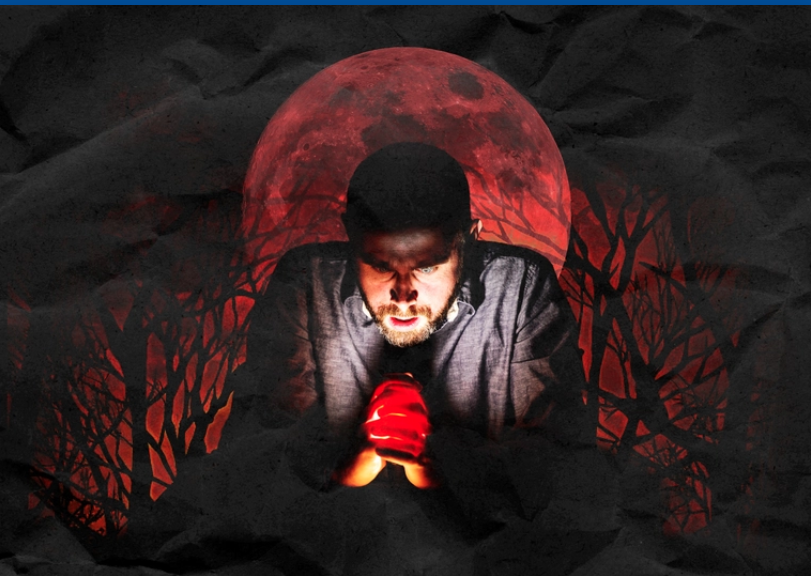
29 April – 1 May
Productions of Macbeth come, these days, not single spies but in battalions. The play has always had a sinister allure for actors and audiences but perhaps it has an especial appeal in an age when autocracies appear to be on the rise.
The Hove-based company Out of Chaos brings its restaging of the tragedy to Oxford under the direction of Mike Tweddle, the CEO of the Playhouse. This is a stripped-back, economical version of Macbeth in two ways. What is already Shakespeare’s shortest play is here pared down to an even briefer 80 minutes. And the twenty or so parts are taken by only two people.
Hannah Barrie and Paul O’Mahony are on stage for the duration, providing an admirable display of stamina and versatility. Switches between characters are indicated by changes of posture, position, tone and accent. So, for example, when Macbeth and Banquo first encounter the witches, the actors face front while speaking as Scottish noblemen and then abruptly turn their backs when uttering the response of the witches. Named entrances and exits are announced – as in ‘Enter Macduff’ – a useful device which helps with clarity.
The audience is recruited to make up the numbers. Sometimes the house lights come up to indicate that we’re all involved as, say, guests at the feast during which Banquo’s ghost manifests itself. At other moments direct participation is invited when Barrie and O’Mahony produce cue cards giving brief answers to questions or commands from the Macbeths. This not only encourages a rapport between actors and audience but it also brings something rarely heard in Macbeth: laughter.
In all this they are given tremendous support by fluent, imaginative lighting (Ashley Bale) and a soundscape (Matt Eaton) which evokes a bleak heath or a crowded banqueting-hall.
Reducing the multiplicity of characters to a duo, though not a gimmick, is definitely a challenge. It helps that much of the action is two-handed in the first place and also that some parts can be condensed, but the staging still involves rapid shifts which may leave an audience unfamiliar with the play a bit confused as to who’s who. For the most part I thought it worked well even if the scene following the discovery of King Duncan’s murder, which involves around half a dozen named parts, was almost comedic in its cascade of comings and goings.
The concision of this Macbeth means that some things have to be discarded. The lengthy scene between Malcolm and Macduff in England, which Shakespeare uses to illuminate the difference between good rulers and tyrants, is here reduced to the few lines where Macduff hears the news of the murder of his family (itself a scene which is usually exploited for its blood-letting but is here downplayed). Some of the poetry is lost too. Literally so in the case of the poignant lines beginning ‘My way of life Is fall’n into the sere, the yellow leaf’ when Macbeth reflects on all the things which he has forfeited in his murderous ambition to lay hands on the crown.
If the tragic introspection of Macbeth is arguably sacrificed on the altar of speed, there are compensations in terms of energy and commitment by the actors. Pace adds to the sense of inevitability. This version of the play is like a runaway train, hurtling faster and faster to disaster.
★★★☆☆ Philip Gooden, 1 May 2025


